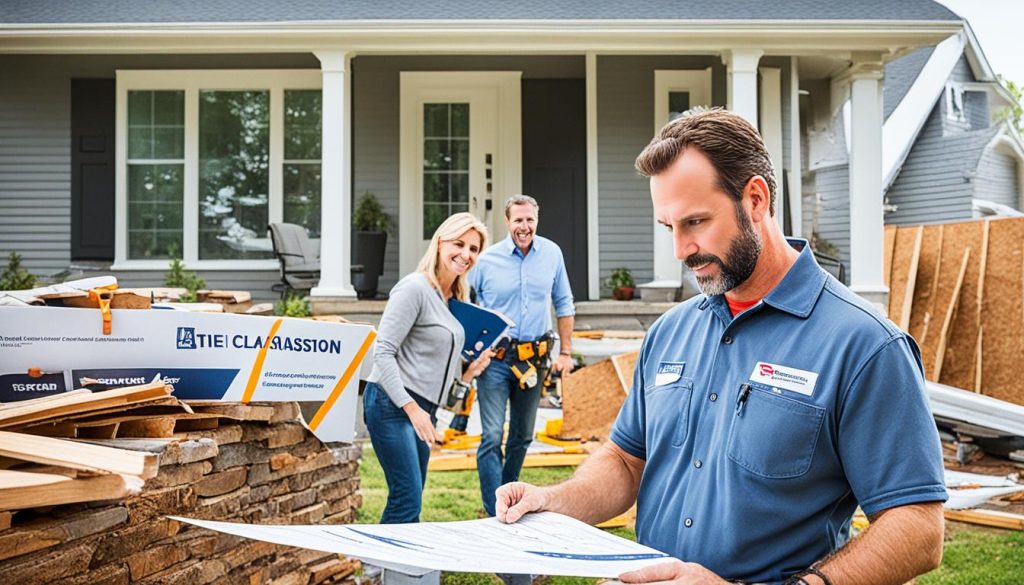Filing a home insurance claim can feel complex. It involves many steps, from knowing the process to picking a good contractor for repairs. Working with a general contractor, though, can simplify everything and reduce stress.
This guide will help you understand the insurance claim process. It will also show you how to work well with a general contractor. Whether this is your first claim or you’ve done it before, you’ll find helpful advice and tips here.
Key Takeaways:
- Understanding the home insurance claim process is crucial for a smooth experience.
- Working with a general contractor can help ensure proper assessment and repairs.
- Managing insurance claim projects requires coordination and organization.
- Disputes can be resolved through appraisal or hiring a public adjuster.
- Clearing debris and assessing damage accurately is essential for an accurate claim.
Understanding the Home Insurance Claim Process
Understanding the home insurance claim process is key. Knowing the steps can make your claims experience smoother. We outline the important steps to file a claim and share tips to help you.
Contact Your Insurance Agent or Company
Start by calling your insurance agent or company quickly. Quick action is key for a good outcome. Give them your policy information and details about the damage. They will tell you what to do next.
Create a Comprehensive Documentation
Documenting the damage is important. Make a detailed list of all damaged items or areas. Also, take photos or videos of the damage. This helps prove your claim and ensures you get the right amount.
Minimize Further Damage and Save Receipts
Try to prevent more damage while waiting for the insurance adjuster. Cover broken windows or put tarps over leaks. Keep all receipts from repairs or any work done. Your insurance might pay you back for these costs.
Coordinate with Your General Contractor and Insurance Adjuster
A general contractor can help during the adjuster’s visit. They know about repairs and can talk to the adjuster about what your home needs. Your contractor can work with your insurance to process your claim correctly.
Stay Informed, Acceptance, and Timely Payments
It’s vital to stay updated on your claim’s progress. Your insurance company should keep you informed. They must tell you if they accept or deny your claim quickly. If they accept it, they should pay you in a timely manner.
To get a good outcome from your home insurance claim, understand the process. Follow these steps to handle your claim with confidence. And if you need help, don’t hesitate to get support from insurance claim experts.
Working with a General Contractor for Insurance Repairs
Working with a general contractor is key for insurance repairs. They play a big role in looking at the damage and planning repairs. They make sure your insurance covers everything needed.
A good general contractor helps a lot with insurance claims. They know how to deal with claims and provide useful documents. They work with other workers, get permits, and follow codes.
“Working with a general contractor for insurance repairs not only ensures that the necessary repairs are done correctly but also that the entire process is managed efficiently.”
Choosing a general contractor brings many benefits. They have a team they trust for different jobs. This makes things faster and ensures pros handle every part of the project.
They also give great advice during the project. They can suggest other ways to fix things if needed. Their help means your home gets fixed right, which is comforting.
Streamlined Process and Expertise
With a general contractor, everything is smoother. They handle talks with your insurance. They make sure all paperwork is done right away. This lets you worry about other things.
Their know-how is super helpful for insurance repairs. They get the tricky parts and overcome any problems. They know all about building and standards, so repairs are top-notch.
Case Study: Johnson Insurance Repairs
| Insurance Repairs | Johnson Insurance Repairs |
|---|---|
| Claims Process | Efficient handling of claims process |
| Documentation | Thorough documentation and filing |
| Coordination | Seamless coordination with insurance company and subcontractors |
| Quality | High-quality repairs completed to industry standards |
The Johnson Insurance Repairs team is great at working with insurance and homeowners. They handle every part of the repair process well. They’re really focused and skilled.
Having a general contractor is a must for home repairs. They know a lot and help guide you through claims and repairs. You’ll feel better knowing your home is in good hands.
Managing Insurance Claim Projects
Effective coordination is vital in managing insurance claim projects. A general contractor takes charge, ensuring the project goes smoothly from start to finish.
The general contractor will handle scheduling. They set up timelines with subcontractors and suppliers. This keeps you and the insurance company informed.
Budgeting is also crucial. The contractor works with you to form a detailed budget, covering repairs and materials. They make sure it matches the insurance company’s estimates.
Your contractor keeps you updated on the progress. They address any concerns promptly. This keeps you involved and at ease.
The goal is to finish the repairs to your satisfaction. Your contractor oversees the work quality, fixing any issues. They aim to return your home to its original state.
This project needs your contractor and insurance company to work together. They ensure all paperwork and approvals are in place. This avoids delays.
Success in these projects depends on communication, organization, and attention to detail. Your general contractor is key. They make sure your home repair journey is hassle-free.
Next, let’s look at common issues in the claims process and how to resolve them.
Disputes and Resolving Issues
Sometimes, you might not agree with what the adjuster says about the damages. If this happens, you can show more evidence to support your side. There are ways to fix these disagreements and reach a fair decision.
Appraisal Process
The appraisal process is one way to solve such disputes. You and your insurance company will each pick an appraiser to estimate the damages. If they don’t agree, a third appraiser, called an umpire, comes in to help decide. The final decision is based on what the two appraisers find or their average, depending on your policy terms.
Hiring a Public Insurance Adjuster
If you’re still unhappy with the insurance company’s decision, you can hire a public insurance adjuster. They’ll work for you, not the insurance company. These experts know how to deal with insurance companies to get you a fair deal. A public adjuster can make sure your claim is looked at correctly and that you get what you’re owed.
Suing the Insurance Company or Seeking Alternative Dispute Resolution
If nothing works, suing the insurance company is an option, but it’s the last one. It takes a lot of time and money. You might want to try other ways, like mediation or arbitration, to find a solution without going to court. These methods are quicker and less stressful.
Disputes in insurance claims are normal, but with time and effort, they can be sorted. This ensures a fair outcome for everyone.
Fixing disputes and reaching a fair agreement is key in handling insurance claims. Whether through appraisal, hiring a public adjuster, or court as a last option, you can get through disagreements. This makes sure your claim is fairly looked at and settled.
Clearing Debris and Assessing Damage
After a disaster like a fire or storm, it’s important to quickly clear debris and check your home’s damage. This step starts the repair process, aiming to get your house back to how it was. A trusted general contractor, focusing on insurance repairs, can make this smoother and ensure important steps aren’t missed.
Your contractor will handle removing debris safely and efficiently. By having experts do this, you can avoid further damage or safety issues. They’ll also check your home carefully to find out what repairs are needed.
The contractor will look at both obvious and hidden damage. This full check-up helps them plan the repairs your home needs. Finding problems early means your insurance can cover all the damage.
It’s key to work closely with your contractor during this process. Share any info or concerns about the damage. This helps them get a full picture. Making a thorough record of the damage, with photos or videos, is also vital for your insurance claim.
Choosing a contractor who knows insurance repairs lets you handle the clean-up and damage check confidently. You’ll know your home is being fixed right.
| Benefits of Clearing Debris and Assessing Damage | How a General Contractor Can Help |
|---|---|
|
|
Temporary Living Arrangements and Additional Living Expenses
If your home becomes unlivable due to damage, finding a temporary place is key. Your insurance might cover extra costs like housing and meals during repairs. This help ensures you stay safe and comfortable while your home is fixed.
For the best use of your benefits, ask your contractor for help. They find good temporary housing and work with your insurance. This lets you focus on staying comfortable without worrying about money.
Your contractor also manages the repairs. They coordinate with others and track the project’s progress. They aim to get repairs done well and quickly, so you can go back home soon.
The goal is a smooth move from temporary housing back to your fixed home. With insurance help and a good contractor, you can deal with living elsewhere easily. It brings confidence and calm during a tough time.
Communication and Documentation
Effective communication and documentation are key in managing insurance claim projects with your general contractor. Clear communication makes sure everyone knows what’s happening. Any issues are quickly fixed. Well-kept documentation makes the claims process easier and provides needed proof for your insurance claim.
Here are some key tips for good communication and documentation:
- Keep a detailed log: Keep a record of all your talks with your insurance company, mortgage lender, and general contractor. Note down dates, names, and how to contact them for easy finding.
- Save written correspondence: Keep all written messages, like emails, letters, and texts, about your insurance claim. These papers are essential if there are any disagreements during the claims process.
- Regularly communicate with your general contractor: Talk often with your general contractor to know how your project is going. This helps deal with any issues or questions and makes sure the project goes well.
- Ensure accurate and timely documentation: Make sure to work closely with your general contractor. This is to make sure all needed paperwork is filled out right and given on time. This includes estimates, invoices, receipts, and any other papers your insurance needs.
“Good communication and keeping documents in order are crucial for successful insurance claim projects. By talking clearly and keeping track of documents, you can move through the claims process well and solve things easily.”
Being organized with your communication and paperwork makes the claims process smoother. Paying close attention to these areas not only helps you manage your insurance claim projects well. It also makes sure your general contractor has what they need to support you.

Conclusion
Working with a general contractor on home insurance claims is key for a smooth process. Understanding the claim process and teaming up with an experienced contractor makes managing these projects easier. This teamwork ensures your home gets fixed just like it was before.
It’s important to settle any issues, handle debris, and assess damage properly. Also, arranging a place to stay is a critical step. Good communication and keeping detailed records help make everything go smoothly. By taking these steps and picking a skilled contractor, you’ll handle home insurance claims well.
Having a general contractor on your side means your home repairs are in expert hands. This lets you focus on getting things back to normal. With the right guide and skills, you can easily work through insurance claims. Choose a contractor with experience in insurance work to represent your interests at every turn.




